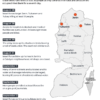
Investors continue to gobble up shares in AI companies, eager to profit off the red-hot sector, but the sharks are circling. The activist short-selling firm Hindenburg Research, famous for its market-making takedowns of top companies such as Block and Adani Group, published two reports last week on companies it views as unduly benefiting from the AI boom: the server and storage manufacturer Super Micro, and the software company iLearningEngines. Both companies’ share prices fell sharply in response.
The reports come amid escalating hype around AI companies, from hyperscaler giants such as Microsoft and Google to hardware firms and even utilities that could profit from the demand. Last week, the GPU manufacturer Nvidia announced better-than-expected earnings results but its stock price still dropped, reflecting growing caution about the frothy industry, especially among institutional investors.
The twin reports from Hindenburg are an even stronger signal of bubble fears, with short-selling firms known to aim at companies or sectors they view as overvalued. Some, including Hindenburg, will take short positions—or bets that a stock will go down—on a company before publishing their findings, hoping they will reap a handsome return from a falling share price.
View this interactive chart on Fortune.com
‘Accounting manipulation’
Hindenburg’s first report came on Tuesday focused on Super Micro, a manufacturer of hardware such as servers and motherboards that are key to AI companies. Prior to Hindenburg’s research, Super Micro had a market cap of around $35 billion, though it fell as much as 26% in the day following the report and has remained around $26 billion.
Super Micro already had a track record of dubious practices, including a temporary delisting from Nasdaq in 2017 for failing to file financial statements, along with SEC charges in 2020 for “widespread accounting violations” that came with a $17.5 million settlement.
In its report, Hindenburg alleged that Super Micro had “ridden the wave of AI enthusiasm” while continuing what the short seller deemed “accounting manipulation.” Based on interviews with former employees and customers, Hindenburg found fresh evidence that Super Micro rehired top executives who were involved in the previous scandal, pushed salespeople to ship defective products to meet quotas, and maintained relationships with undisclosed parties, including two Taiwan-based entities owned by the youngest brother of Super Micro’s CEO. “Basically it’s a governance issue,” a former executive told Hindenburg.
The day after the report, Super Micro issued a press release announcing that it would not file its annual report with the SEC on time in order to “complete its assessment of the design and operating effectiveness of its internal controls over financial reporting.”
When reached for comment, a Super Micro spokesperson shared a CEO letter from Tuesday filed with the SEC on Tuesday stating that neither the Hindenburg report nor the delayed annual filing “affects our products or our ability and capacity to deliver the innovative IT solutions that you rely on every day.” The letter added that the report contained “false or inaccurate statements about our company including misleading presentations of information that we have previously shared publicly.”
Despite the negative outlook, Hindenburg did admit a bull case for Super Micro, which would entail “meteoric growth” in response to demand for AI chips. The short-selling firm cited Bloomberg, where analysts forecast 87% revenue growth in 2025—or at least, before the report came out.
‘Artificial partners and artificial revenue’
Hindenburg’s report on iLearningEngines from Thursday proved even more damning. Similar to Super Micro, Hindenburg characterized iLearningEngines as a company taking advantage of the AI wave, though the short seller expressed skepticism that the company ever had a focus on the emerging sector prior to the boom.
iLearningEngines went public through a SPAC in April 2024, though its share price sat around just $3 before the report, falling to under $1.50 after Hindenburg’s investigation with a market cap of around $175 million.
While iLearningEngines claims to be an “early pioneer in enterprise AI” through “learning automation” software, Hindenburg alleged that the company lied to the SEC during its SPAC process by misrepresenting its partners and revenue streams. Hindenburg also argues that iLearningEngines has “no obvious industry presence” and nonexistent revenue, despite claiming more than 1,000 enterprise customers. “We do not expect it will remain a public company for long,” the short-seller concluded.
“We have reviewed the full report and believe it contains misleading statements,” iLearningEngines said in a statement published following Hindenburg’s report. “We intend to respond in the coming days.”
A spokesperson did not immediately respond to a request for further comment.
While Super Micro and iLearningEngines are smaller companies in the broader AI field, the entire sector experienced a sell-off on Tuesday, the first day of trading in September. Nvidia and other chip manufacturers continued to trade down, with the tech-heavy Nasdaq falling over 3%.
This story was originally featured on Fortune.com
EMEA Tribune is not involved in this news article, it is taken from our partners and or from the News Agencies. Copyright and Credit go to the News Agencies, email news@emeatribune.com Follow our WhatsApp verified Channel





